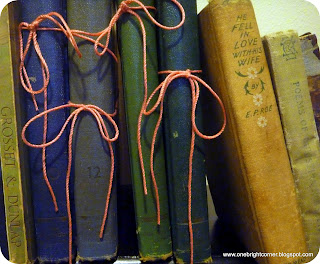A friend and I met for coffee, and as we sat down with our steaming mugs in hand, I could tell that something was wrong. First of all, her once-beautiful hair was now boy-short; her eyes had lost their sparkle and looked dull and sad; she sported one of those stick-on rhinestones meant to look like a nose piercing (I hope it wasn't real!), and her shirt was waaaaay lower than I would wear. So we chit-chatted for awhile--she caught me up on all the latest news, good and bad, about our mutual friends. Eventually, I questioned whether her parents supported her in all these...changes. At this point, she flew off the handle, and with a face ten shades darker than it was five seconds ago, she told me off and left the shop. The whole situation saddens me, because I’m really not sure when I’ll see her again, or who she is turning out to be. Pray for her with me, won’t you?
So that scenario never happened (any resemblance to real persons, living or dead, is purely coincidental, and, I promise, I love meeting friends for coffee!), but it sure got you to click through your feed, didn’t it? Funny how a little dirt on someone will pique a person’s interest. Of course, a little dirt on myself would do the same thing, but why would I share dirt on myself? Gossip. I’ve been thinking a lot about it lately. There’s no better way to inject a bit of adrenaline into a lagging conversation than to share a tasty tidbit on someone else. The best prayer requests come from back-fence talk, and we always appreciate a warning through the grapevine. Much better to learn from other people’s mistakes, so we prattle those mistakes as a tutorial in what not to do.
If you’re reading the latest celebrity news, listening to Dr. Laura, watching reality T.V., blogging about someone else’s troubles, snooping for details in a conversation, or buzzing the details to someone else, chances are, you’re gossiping.
The Sin of Gossip
Yenta, that nosy matchmaker on Fiddler on the Roof, doesn’t seem so horrible, but she is actually committing serious offenses. Sharing the scuttlebutt is intrinsically opaque and dishonest (Psalms 101:5-8)—who is there to factcheck or verify your statements? Have you considered that the next generation—your children—learn the skill by watching you and practicing in the great family tradition of slander (I Peter 1:18)? So watch yourself! Gossip brings anger and distress (II Peter 2:7), and secondhand accounts are corrupt, vain, and contentious (Ephesians 2:3). Furthermore, we undermine the unity of the Church and our testimony in Christ when we choose to expand the grapevine (Colossians 3:8-10).
Sometime when I was in my early teens, a new family started attending our church. My friendship with them was only weeks-old, but somehow I thought I observed attitudes and conduct between them that caused me to assume that the husband was not a Christian. I was idling away the minutes in conversation with a friend, when I discovered that she also knew this family—and had known them for awhile.
“Well, you know he’s unsaved, right?” I commented, anxious to discuss this interesting development.
My friend’s look of choking shock brought me to my senses faster than a douse of cold water. “Really?” she asked breathlessly.
Horrified, I realized what I had just done, and the import of my words. “Oh, no. Never mind,” I hastily backtracked. “I don’t know them very well. I guess he is a Christian. I don’t know what I was thinking.”
I came to realize later, from my own observations and the father’s testimony, that he was indeed saved, and I shudder to think of how far the rumor I almost started could have gone. What damage to a worthy man’s reputation could I have caused? What division in the body of Christ? And what irreperable harm to his own soul and well-being?
There’s a reason which trumps all others as to why gossip should never be a part of our conversation.
“Humble yourselves in the sight of the Lord, and He will lift you up. Do not speak evil of one another, brethren. He who speaks evil of a brother and judges his brother, speaks evil of the law and judges the law. But if you judge the law, you are not a doer of the law but a judge. There is one Lawgiver, who is able to save and to destroy. Who are you to judge another (James 4:10-12)?”
When you gossip, you are playing God.
Make a Change
Don’t be like Verbena (housekeeper on The Parent Trap) who is famously quoted in our family for her quips “It's none of my nevermind. I don't say a word,” and “I'm not saying a word. Not one single word,” when she so obviously did make the hearsay her nevermind and said many, many words. Let the gossip stop with you. Don’t share something hurtful, damaging, private, or sensitive with someone else, unless you’re absolutely assured that it involves the person (usually, this means that you’re sharing with an authority over you or him).
Don’t allow someone else to gossip to you either. I was just talking to a dear, wise old lady in our church about this problem with gossiping. She agreed with me that there is something so very tempting to our curiousity to hear the “latest” report. So I asked her how she has succeeded in graciously asking others to not gossip to her.
Don’t allow someone else to gossip to you either. I was just talking to a dear, wise old lady in our church about this problem with gossiping. She agreed with me that there is something so very tempting to our curiousity to hear the “latest” report. So I asked her how she has succeeded in graciously asking others to not gossip to her.
“Well, Mikaela,” she said, “You have to be brave—you have to be really brave. I’ve had to do that with a few friends of mine, and it’s not easy.” But she also pointed out that those friends never gossiped to her again—and hopefully, they were convicted by her example! I’ve been on both sides of this. I’ve maligned others, sinning against them and the people to whom I’m talking; moreover, I’ve listened to the tales of friends, enjoying the mystery and the scandal of it.
This is serious business, folks. By ignoring the issue, you are calling your own relationship with God into question: “If any man among you seem to be religious, and bridleth not his tongue, but deceiveth his own heart, this man's religion [is] vain (James 1:26).” Just by purposing to change your conversation habits, you may cause the unsaved to turn to the Lord. “Having your conduct honorable among the Gentiles, that when they speak against you as evildoers, they may, by your good works which they observe, glorify God in the day of visitation (I Peter 2:12).”
I hope that those of you with whom I interact will keep me accountable and stop me before I exhibit someone’s dirty laundry (and, by implication, my own). And I hope that all of you will have a serious conversation about this with your own friends and family, committing each other to honest and honorable conversation.

Photo Credit: Taylor Dawn Fortune
Scripture taken from the New King James Version. Copyright © 1982 by Thomas Nelson,
Inc. Used by permission. All rights reserved.






















